Jizhong Liu
MiDashengLM: Efficient Audio Understanding with General Audio Captions
Aug 06, 2025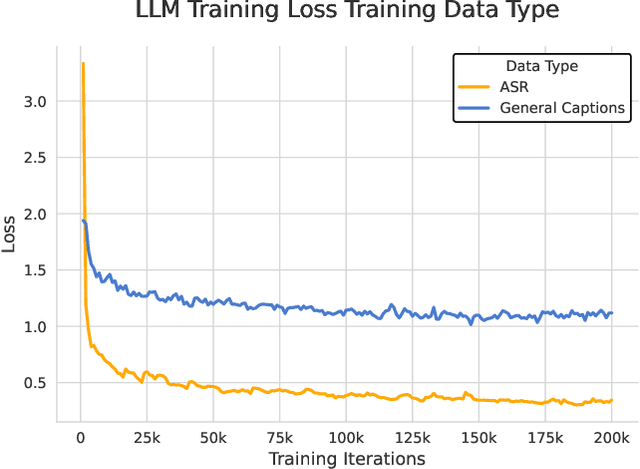
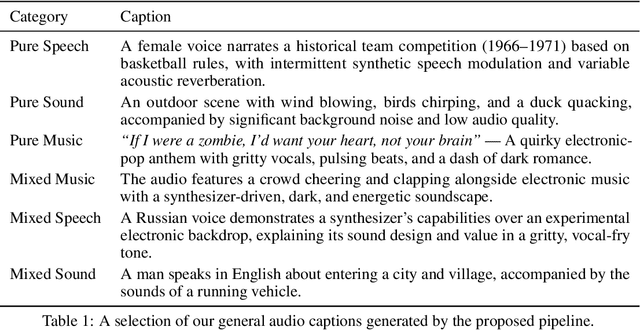
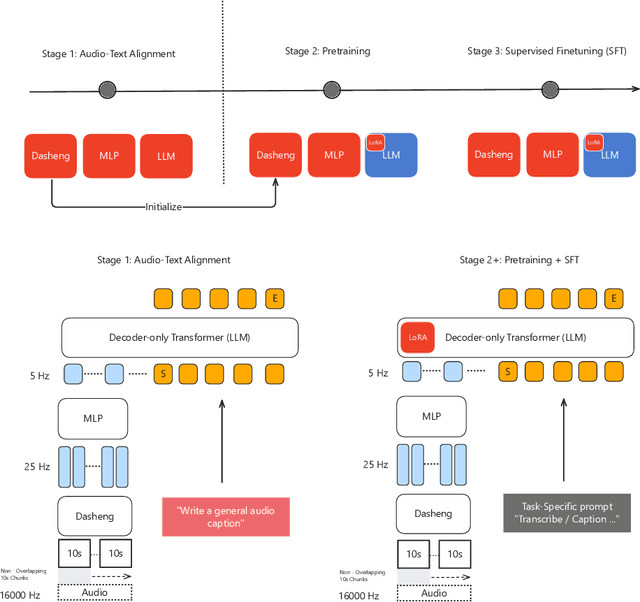
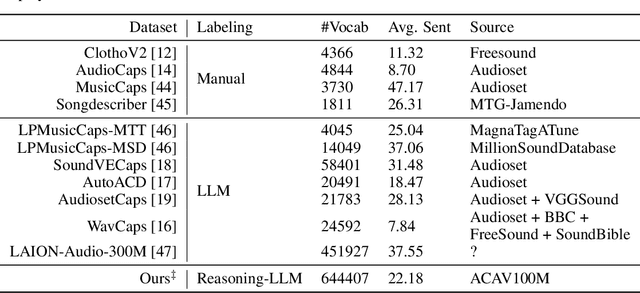
Abstract:Current approaches for large audio language models (LALMs) often rely on closed data sources or proprietary models, limiting their generalization and accessibility. This paper introduces MiDashengLM, a novel open audio-language model designed for efficient and comprehensive audio understanding through the use of general audio captions using our novel ACAVCaps training dataset. MiDashengLM exclusively relies on publicly available pretraining and supervised fine-tuning (SFT) datasets, ensuring full transparency and reproducibility. At its core, MiDashengLM integrates Dasheng, an open-source audio encoder, specifically engineered to process diverse auditory information effectively. Unlike previous works primarily focused on Automatic Speech Recognition (ASR) based audio-text alignment, our strategy centers on general audio captions, fusing speech, sound and music information into one textual representation, enabling a holistic textual representation of complex audio scenes. Lastly, MiDashengLM provides an up to 4x speedup in terms of time-to-first-token (TTFT) and up to 20x higher throughput than comparable models. Checkpoints are available online at https://huggingface.co/mispeech/midashenglm-7b and https://github.com/xiaomi-research/dasheng-lm.
GLAP: General contrastive audio-text pretraining across domains and languages
Jun 12, 2025



Abstract:Contrastive Language Audio Pretraining (CLAP) is a widely-used method to bridge the gap between audio and text domains. Current CLAP methods enable sound and music retrieval in English, ignoring multilingual spoken content. To address this, we introduce general language audio pretraining (GLAP), which expands CLAP with multilingual and multi-domain abilities. GLAP demonstrates its versatility by achieving competitive performance on standard audio-text retrieval benchmarks like Clotho and AudioCaps, while significantly surpassing existing methods in speech retrieval and classification tasks. Additionally, GLAP achieves strong results on widely used sound-event zero-shot benchmarks, while simultaneously outperforming previous methods on speech content benchmarks. Further keyword spotting evaluations across 50 languages emphasize GLAP's advanced multilingual capabilities. Finally, multilingual sound and music understanding is evaluated across four languages. Checkpoints and Source: https://github.com/xiaomi-research/dasheng-glap.
Reinforcement Learning Outperforms Supervised Fine-Tuning: A Case Study on Audio Question Answering
Mar 17, 2025
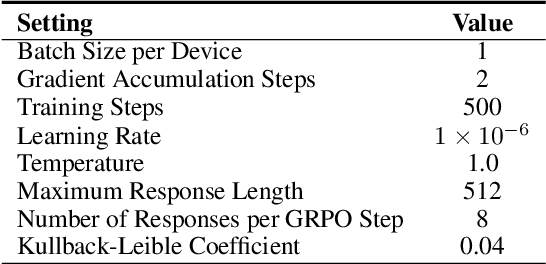

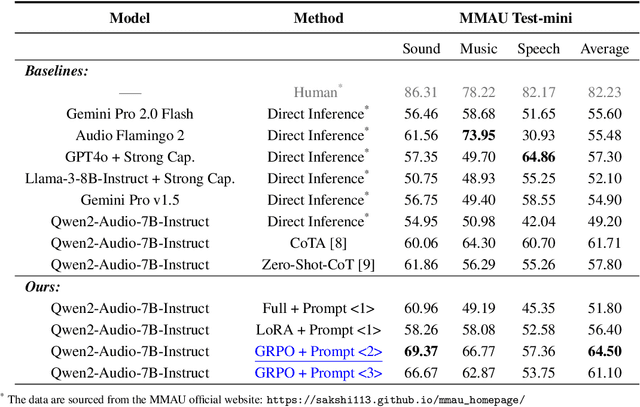
Abstract:Recently, reinforcement learning (RL) has been shown to greatly enhance the reasoning capabilities of large language models (LLMs), and RL-based approaches have been progressively applied to visual multimodal tasks. However, the audio modality has largely been overlooked in these developments. Thus, we conduct a series of RL explorations in audio understanding and reasoning, specifically focusing on the audio question answering (AQA) task. We leverage the group relative policy optimization (GRPO) algorithm to Qwen2-Audio-7B-Instruct, and our experiments demonstrated state-of-the-art performance on the MMAU Test-mini benchmark, achieving an accuracy rate of 64.5%. The main findings in this technical report are as follows: 1) The GRPO algorithm can be effectively applied to large audio language models (LALMs), even when the model has only 8.2B parameters; 2) With only 38k post-training samples, RL significantly outperforms supervised fine-tuning (SFT), indicating that RL-based approaches can be effective without large datasets; 3) The explicit reasoning process has not shown significant benefits for AQA tasks, and how to efficiently utilize deep thinking remains an open question for further research; 4) LALMs still lag far behind humans auditory-language reasoning, suggesting that the RL-based approaches warrant further exploration. Our project is available at https://github.com/xiaomi-research/r1-aqa and https://huggingface.co/mispeech/r1-aqa.
Enhancing Automated Audio Captioning via Large Language Models with Optimized Audio Encoding
Jun 19, 2024Abstract:Automated audio captioning (AAC) is an audio-to-text task to describe audio contents in natural language. Recently, the advancements in large language models (LLMs), with improvements in training approaches for audio encoders, have opened up possibilities for improving AAC. Thus, we explore enhancing AAC from three aspects: 1) a pre-trained audio encoder via consistent ensemble distillation (CED) is used to improve the effectivity of acoustic tokens, with a querying transformer (Q-Former) bridging the modality gap to LLM and compress acoustic tokens; 2) we investigate the advantages of using a Llama 2 with 7B parameters as the decoder; 3) another pre-trained LLM corrects text errors caused by insufficient training data and annotation ambiguities. Both the audio encoder and text decoder are optimized by -Base (LoRA). Experiments show that each of these enhancements is effective. Our method obtains a 33.0 SPIDEr-FL score, outperforming the winner of DCASE 2023 Task 6A.
Bridging Language Gaps in Audio-Text Retrieval
Jun 11, 2024

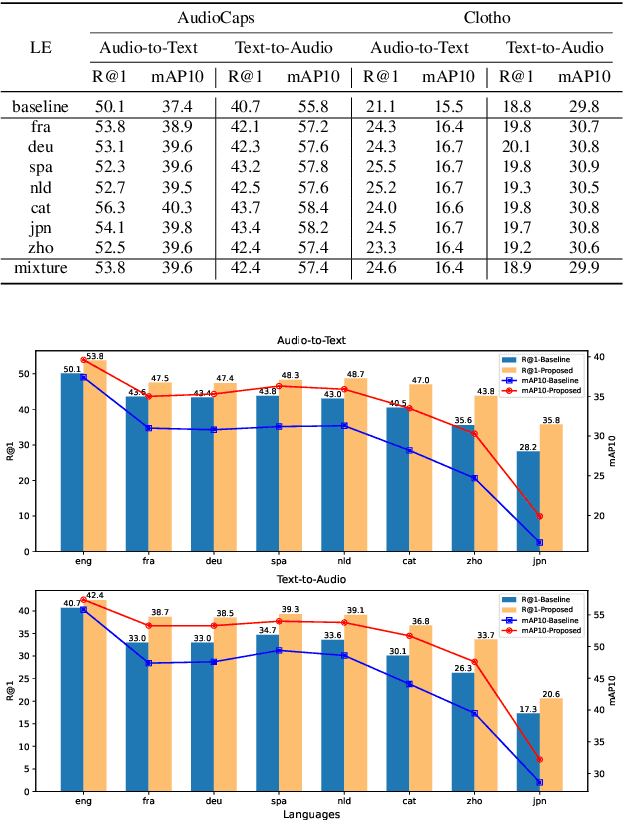
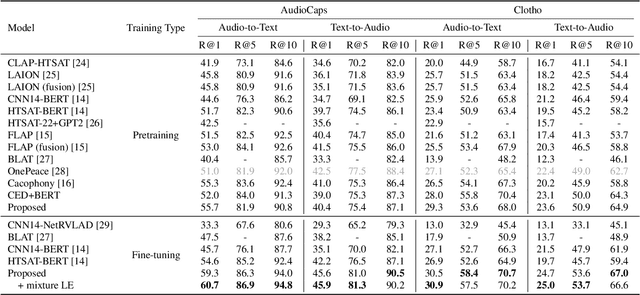
Abstract:Audio-text retrieval is a challenging task, requiring the search for an audio clip or a text caption within a database. The predominant focus of existing research on English descriptions poses a limitation on the applicability of such models, given the abundance of non-English content in real-world data. To address these linguistic disparities, we propose a language enhancement (LE), using a multilingual text encoder (SONAR) to encode the text data with language-specific information. Additionally, we optimize the audio encoder through the application of consistent ensemble distillation (CED), enhancing support for variable-length audio-text retrieval. Our methodology excels in English audio-text retrieval, demonstrating state-of-the-art (SOTA) performance on commonly used datasets such as AudioCaps and Clotho. Simultaneously, the approach exhibits proficiency in retrieving content in seven other languages with only 10% of additional language-enhanced training data, yielding promising results. The source code is publicly available https://github.com/zyyan4/ml-clap.
 Add to Chrome
Add to Chrome Add to Firefox
Add to Firefox Add to Edge
Add to Edge